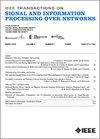基于策略网络设计的博弈论分布式经验风险最小化
IF 3
3区 计算机科学
Q2 ENGINEERING, ELECTRICAL & ELECTRONIC
IEEE Transactions on Signal and Information Processing over Networks
Pub Date : 2023-08-17
DOI:10.1109/TSIPN.2023.3306106
引用次数: 3
摘要
本文考虑了网络上分布式经验风险最小化(ERM)问题的博弈论框架,其中节点处的信息获取被建模为参与者的理性选择。在所提出的游戏中,玩家决定学习参数和网络结构。纳什均衡(NE)表征了学习分类器的局部性能和全局一致性之间的折衷。我们首先介绍了一种交错方法,该方法的特点是联合学习过程将每个节点的迭代学习与网络形成相结合。我们证明了在无向网络的情况下,我们的对策等价于广义势对策。我们研究了所提出的交错算法的收敛性,分析了由我们的博弈确定的网络结构,并展示了与固定网络上的标准分布式ERM相比,社会福利的改善。为了使我们的框架适应流数据,我们导出了一个分布式卡尔曼滤波器。在在线镜像下降算法的基础上,引入了一种并行算法,对网元进行了整体求解。在案例研究中,我们使用帕金森病远程监测的数据来证实结果。本文章由计算机程序翻译,如有差异,请以英文原文为准。
Game-Theoretic Distributed Empirical Risk Minimization With Strategic Network Design
This article considers a game-theoretic framework for distributed empirical risk minimization (ERM) problems over networks where the information acquisition at a node is modeled as a rational choice of a player. In the proposed game, players decide both the learning parameters and the network structure. The Nash equilibrium (NE) characterizes the tradeoff between the local performance and the global agreement of the learned classifiers. We first introduce an interleaved approach that features a joint learning process that integrates the iterative learning at each node with the network formation. We show that our game is equivalent to a generalized potential game in the setting of undirected networks. We study the convergence of the proposed interleaved algorithm, analyze the network structures determined by our game, and show the improvement of social welfare compared to a standard distributed ERM over fixed networks. To adapt our framework to streaming data, we derive a distributed Kalman filter. A concurrent algorithm based on the online mirror descent algorithm is also introduced to solve for NE in a holistic manner. In the case study, we use data from telemonitoring of Parkinson's disease to corroborate the results.
求助全文
通过发布文献求助,成功后即可免费获取论文全文。
去求助
来源期刊

IEEE Transactions on Signal and Information Processing over Networks
Computer Science-Computer Networks and Communications
CiteScore
5.80
自引率
12.50%
发文量
56
期刊介绍:
The IEEE Transactions on Signal and Information Processing over Networks publishes high-quality papers that extend the classical notions of processing of signals defined over vector spaces (e.g. time and space) to processing of signals and information (data) defined over networks, potentially dynamically varying. In signal processing over networks, the topology of the network may define structural relationships in the data, or may constrain processing of the data. Topics include distributed algorithms for filtering, detection, estimation, adaptation and learning, model selection, data fusion, and diffusion or evolution of information over such networks, and applications of distributed signal processing.
 求助内容:
求助内容: 应助结果提醒方式:
应助结果提醒方式:


